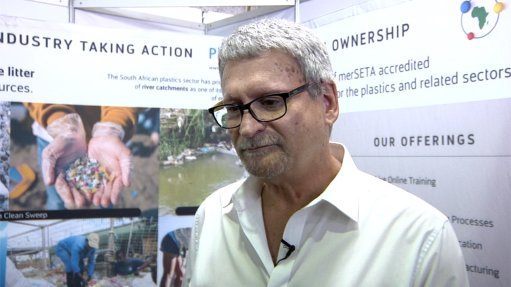Business innovation survey to evaluate opportunities, barriers and challenges

The Centre for Science, Technology and Innovation Indicators for the Department of Science and Innovation (CeSTII) will conduct the seventh Business Innovation Survey. CeSTII head Dr Glenda Kruss provides an overview of the survey series and how the information is used and shared, while GeoScope director Bob Currin details how the 5 500 sample of 5 500 businesses was selected and how the data and confidentiality is handled.
The Human Sciences Research Council's (HSRC's) Centre for Science, Technology and Innovation Indicators (CeSTII) will start conducting the seventh Business Innovation Survey on March 12.
The survey will gather the opinions of 5 500 randomly selected, locally registered large to very small businesses to evaluate strengths and weaknesses in the national system of innovation, says Department of Science and Innovation senior analyst Kgomotso Matjila.
Covering a three-year period from 2019 to 2021, the business innovation survey method uses Organisation for Economic Cooperation and Development (OECD) international measurement tools to compare South Africa's innovation with that of other countries.
The updated OECD Oslo manual defines and provides methodology for measuring innovation in products and processes. This broadens the scope beyond product innovation and enables measurement of innovation across industries and sectors, including of social innovation and public sector innovation.
However, the Business Innovation Survey focuses only on formal sector companies, and the results will provide a picture of innovation activities.
This data will then be analysed and used to inform policies that must be put in place to improve the national system, as well as to evaluate the impact of existing policy instruments, such as research and development tax incentives, says Matjila.
“We will also use the data to assess other government incentives with a view to understanding and creating linkages and networks between innovators and knowledge producers,” she adds.
The survey will collect data from the sample of enterprises drawn from the business register held by Statistics South Africa (Stats SA). It will include enterprises in mining; manufacturing; electricity, gas and water supply; services, including wholesale and retail trade; transport, storage and communication; financial intermediation; computer and related activities; research and development; architectural and engineering activities; and technical testing and analysis.
The survey collects information about a business’s innovations. This may include new products, new processes, as well as improvements to existing products or ways of working.
Further, the survey treats all information with strict confidentiality and the data are stored on a secure server, says research service provider GeoScope director Bob Currin. GeoScope is providing the team and services that will conduct the survey on behalf of CeSTII and the DSI.
The Business Innovation Survey is important for policy makers in South Africa to understand the scale and patterns of innovation so that they can adjust policy instruments accordingly, says CeSTII head Dr Glenda Kruss.
“Innovation is internationally recognised as a key driver of economic growth. It takes place in many businesses, including big, small, micro and informal. Countries are best placed to solve wide-ranging social and economic challenges when innovative products and processes are adopted and technological capacity is built.
“South Africa faces considerable economic challenges, worsened by Covid-19. Measuring our capacity to innovate and thus grow our economy and increase employment is now especially relevant,” says Kruss.
The survey has been conducted in three-yearly cycles since 2002, and CeSTII is now building a longitudinal dataset covering the entire period.
“These datasets are available for wider use through the HSRC's data curation, which is also responsible for maintaining national data repositories, and the CeSTII provides a data team that can work with interested parties on analysing the data,” she points out.
Further, Kruss highlights that innovation trend data is used for benchmarking, networking and lobbying by policy actors, commercial firms, industry associations, chambers of commerce and regional business associations.
As the survey's methodology is based on international practices, individual businesses can benchmark themselves against local companies and international trends.
Similarly, industry associations can benchmark their sector against national and global trends. They can then take actions based on this information, such as supporting skills development to improve processes, or sharing research and development costs to the mutual benefit of companies.
Additionally, the data helps to indicate focus areas and priorities, such as the most recent 2016 to 2018 survey indicating that only 24% of services firms and 16% of industry firms that are innovating collaborate with other partners, such as suppliers, clients, or public and private research institutions, she says.
“The data indicates that firms that collaborate are more likely to do so to access knowledge, research and development and critical expertise and skills. Further, firms in the services sector are more likely to collaborate with suppliers, competitors and customers. This is how we can use data to prioritise policy actions and how to promote collaboration and innovation networks.”
CeSTII spends significant time and effort to ensure the data is of high quality, and an additional focus is on strengthening the visualisation of the data to aid analysis and drive insights, as well as to communicate the indicators more effectively to policy actors and organisations in the national system of innovation, so that the data can be useful to inform actions and provide evidence for policy, says Kruss.
“The Covid-19 pandemic has impacted on many businesses, and the survey will help to develop a detailed picture of business innovation in South Africa in the recent past. This will enable us to hone our policy instruments to support and boost innovation, productivity and competitiveness in our country.”
Business leaders will be contacted by fieldworkers from GeoScope. The survey can be self-completed online or during a telephone interview. The companies in the survey sample were randomly selected by Stat SA, which also provided expert support to help CeSTII to ensure the survey and its results are robust and representative.
The survey results will be analysed this year and published in 2023.
Comments
Announcements
What's On
Subscribe to improve your user experience...
Option 1 (equivalent of R125 a month):
Receive a weekly copy of Creamer Media's Engineering News & Mining Weekly magazine
(print copy for those in South Africa and e-magazine for those outside of South Africa)
Receive daily email newsletters
Access to full search results
Access archive of magazine back copies
Access to Projects in Progress
Access to ONE Research Report of your choice in PDF format
Option 2 (equivalent of R375 a month):
All benefits from Option 1
PLUS
Access to Creamer Media's Research Channel Africa for ALL Research Reports, in PDF format, on various industrial and mining sectors
including Electricity; Water; Energy Transition; Hydrogen; Roads, Rail and Ports; Coal; Gold; Platinum; Battery Metals; etc.
Already a subscriber?
Forgotten your password?
Receive weekly copy of Creamer Media's Engineering News & Mining Weekly magazine (print copy for those in South Africa and e-magazine for those outside of South Africa)
➕
Recieve daily email newsletters
➕
Access to full search results
➕
Access archive of magazine back copies
➕
Access to Projects in Progress
➕
Access to ONE Research Report of your choice in PDF format
RESEARCH CHANNEL AFRICA
R4500 (equivalent of R375 a month)
SUBSCRIBEAll benefits from Option 1
➕
Access to Creamer Media's Research Channel Africa for ALL Research Reports on various industrial and mining sectors, in PDF format, including on:
Electricity
➕
Water
➕
Energy Transition
➕
Hydrogen
➕
Roads, Rail and Ports
➕
Coal
➕
Gold
➕
Platinum
➕
Battery Metals
➕
etc.
Receive all benefits from Option 1 or Option 2 delivered to numerous people at your company
➕
Multiple User names and Passwords for simultaneous log-ins
➕
Intranet integration access to all in your organisation



















